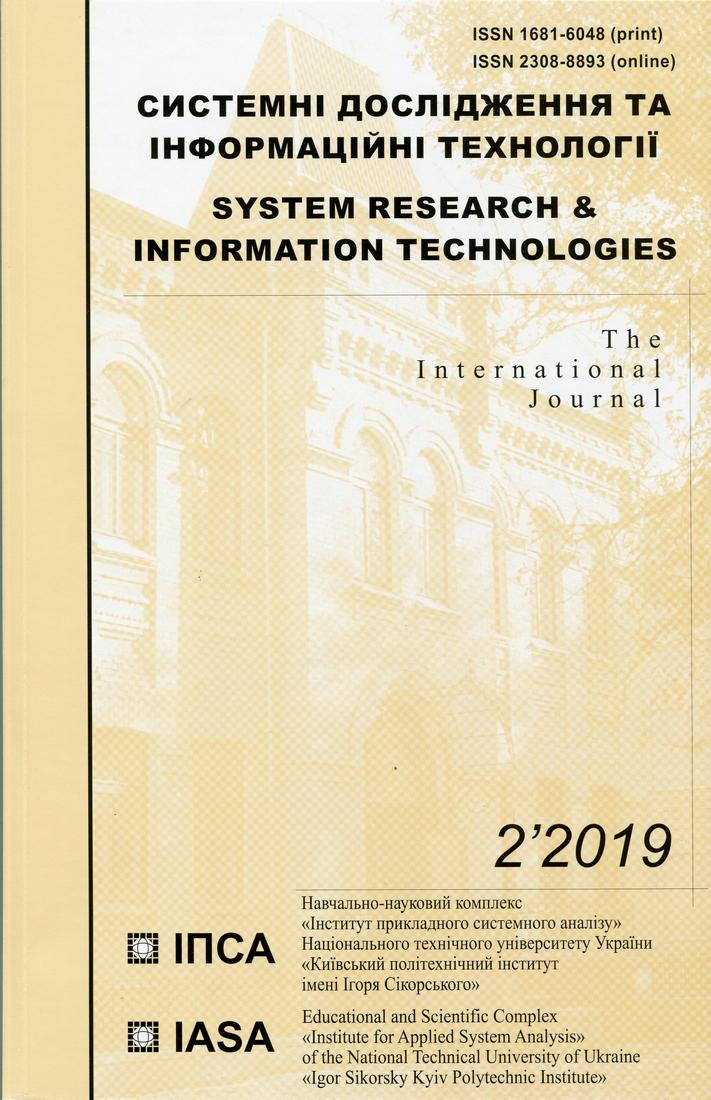Network structures and systems: IV. Parallel processing of continuous monitoring results
DOI:
https://doi.org/10.20535/SRIT.2308-8893.2019.2.09Keywords:
network system, hierarchy, continuous monitoring, interactive evaluation, parallelization, computer environment, speed up of computationsAbstract
The procedure for interactive evaluation of complex hierarchical network system components is formalized. Appropriate algorithmic constructions are proposed for an effective implementation of this procedure on multi-core computers and clusters. These constructions determine the prospect of parallelization and take into account the limited possibilities of computing resources. Estimates of complexity and speed up of parallel computations, which confirm the high efficiency of proposed constructions, are given. The obtained results can be used by means of modern software for real-time evaluation of many complex systems, the state and behavior of which constantly change over time, in particular transport systems, energy and life support systems, banking and trade networks, ecosystems of separate regions, etc.References
Owen C.L. Evaluation of complex systems / C.L. Owen // Designe Studies. — 2007. — 28, N 1. — P. 73–101.
Norros L. Usability evaluation of complex systems / L. Norros, P. Saviola // STUK, Helsinki, 2004. — 44 p.
Bar-Yam Y. About Engineering Complex Systems: Multiscale Analysis and Evolutionary Engineering. In: Engineering Self-Organising Systems / Ed. by Y. Bar-Yam // Heidelberg: Springer-Verlag, 2005. — P. 16–31.
Polishchuk D.O. Kompleksne determinovane otsinjuvannja skladnykh iyerarkhichno-merezhevykh system: I. Opys metodyky / D.O. Polishchuk, O.D. Polishchuk, M.S. Jadzhak // Systemni doslidzhennja ta informatsijni tekhnolohiyi. — 2015. — № 1. — S. 21–31.
Polishchuk D.O. Kompleksne determinovane otsinjuvannja skladnykh iyerarkhichno-merezhevykh system: II. Lokal'ne ta prohnostychne otsinjuvannja / D.O. Polishchuk, O.D. Polishchuk, M.S. Jadzhak // Systemni doslidzhennja ta informatsijni tekhnolohiyi. — 2015. — № 2. — S. 26–38.
Polishchuk D.O. Kompleksne determinovane otsinjuvannja skladnykh iyerarkhichno-merezhevykh system: III. Ahrehovane otsinjuvannja / D.O. Polishchuk, O.D. Polishchuk, M.S. Jadzhak // Systemni doslidzhennja ta informatsijni tekhnolohiyi. — 2015. — № 4. — S. 20–31.
Polishchuk D.O. Kompleksne determinovane otsinjuvannja skladnykh iyerarkhichno-merezhevykh system: IV. Interaktyvne otsinjuvannja / D.O. Polishchuk, O.D. Polishchuk, M.S. Jadzhak // Systemni doslidzhennja ta informatsijni tekhnolohiyi. — 2016. — № 1. — S. 7–16.
Polishchuk O.D. Lokal'ne otsinjuvannja jakosti funktsionuvannja skladnykh system na pidstavi paralel'nykh obchyslen' / O.D. Polishchuk, M.I. Tjutjunnyk, M.S. Jadzhak // Vidbir i obrobka informatsiyi. — 2010. — Vyp. 32 (108). — S. 119–124.
Polishchuk O.D. Otsinjuvannja jakosti funktsionuvannja skladnykh system na osnovi paralel'noyi orhanizatsiyi obchyslen' / O.D. Polishchuk, M.I. Tjutjunnyk, M.S. Jadzhak // Vidbir i obrobka informatsiyi. — 2007. — Vyp. 26 (102). — S. 121–126.
Jadzhak M.S. Optymizatsija metodyky kompleksnoho otsinjuvannja skladnykh system na pidstavi paralel'nykh obchyslen' / M.S. Jadzhak, O.D. Polishchuk, M.I. Tjutjunnyk // Informatyka ta matematychni metody v modeljuvanni. — 2016. — № 4. — S. 347–356.
Polishchuk O.D. Merezhevi struktury ta systemy: III. Iyerarkhiyi ta merezhi / O.D. Polishchuk, M.S. Jadzhak // Systemni doslidzhennja ta informatsijni tekhnolohiyi. — 2018. — № 4. — S. 82–95.
Anisimov A.V. Postroenie optimal'nyh algoritmov massovyh vychislenij v zadachah tsifrovoj fil'tratsii /A.V. Anisimov, M.S. Jadzhak // Kibernetika i sistemnyj analiz. — 2008. — № 4. — S. 3–14.
Jadzhak M.S. Optimal'nyj algoritm reshenija zadachi tsifrovoj fil'tratsii s ispol'zovaniem adaptivnogo sglazhivanija / M.S. Jadzhak, M.I. Tjutjunnik // Kibernetika i sistemnyj analiz. — 2013. — № 3. — S. 142–151.
Jadzhak M.S. Paralel'ni alhorytmy rozv’jazannja prostorovoyi zadachi tsyfrovoyi fil'tratsiyi danykh / M.S. Jadzhak // Informatyka ta matematychni metody v modeljuvanni. — 2017. — № 3. — S. 234–239.
Val'kovskij V.A. Rasparallelivanie algoritmov i programm. Strukturnyj podhod / V.A. Val'kovskij. — M.: Radio i svjaz', 1989. — 176 s.
Rejtynhovyj spysok najpotuzhnishykh system svitu [Digital source]. — Available at: www.top500.org.
Polishchuk O.D. Merezhevi struktury ta systemy: I. Potokovi kharakterystyky skladnykh merezh / O.D. Polishchuk, M.S. Jadzhak // Systemni doslidzhennja ta informatsijni tekhnolohiyi. — 2018. — № 2. — S. 42–54.
Polishchuk O.D. Merezhevi struktury ta systemy: II. Sertsevyny merezh ta mul'typleksiv / O.D. Polishchuk, M.S. Jadzhak // Systemni doslidzhennja ta informatsijni tekhnolohiyi. — 2018. — № 3. — S. 38–51.
Polishchuk O. Issues of Regional Development and Evaluation Problems / O. Polishchuk, D. Polishchuk, M. Yadzhak, M. Tyutyunnyk // AASCIT Communications. — 2015. — 2, N 4. — P. 115–120.
Polishchuk O. Big Data Processing in Complex Hierarchical Network Systems / O. Polishchuk, D. Polishchuk, M. Yadzhak, M. Tyutyunnyk // arXiv preprint arXiv: 1603.00633. — 2016. — 7 p.

